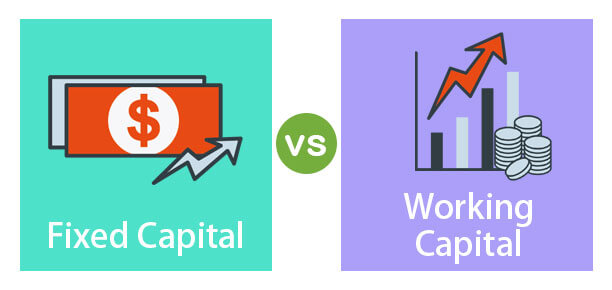What Is Fixed Capital and Working Capital
Fixed Capital and Working Capital Differences
The primary difference between fixed capital and working capital is that Fixed Capital is the capital which is invested by the company in procuring the fixed assets required for the working of the business whereas working capital is the capital which is required by the company for the purpose of financing its day to day operations.
Capital is a critical ingredient in any business. Without capital, no business can be run, and no business can exist. Capital can be categorized in two forms – fixed capital and working capital.
- Fixed capital is used to acquire non-current assets that would serve the business for more than one accounting period Accounting Period refers to the period in which all financial transactions are recorded and financial statements are prepared. This might be quarterly, semi-annually, or annually, depending on the period for which you want to create the financial statements to be presented to investors so that they can track and compare the company's overall performance. read more .
- On the other hand, working capital is used to serve the business on a day-to-day basis fulfilling the requirement of everyday production and operation.

You are free to use this image on your website, templates etc, Please provide us with an attribution link Article Link to be Hyperlinked
For eg:
Source: Difference Between Fixed Capital and Working Capital (wallstreetmojo.com)
In this article, we will look at each of them separately and would also look at a comparative analysis between them.
Fixed Capital vs Working Capital Infographics

You are free to use this image on your website, templates etc, Please provide us with an attribution link Article Link to be Hyperlinked
For eg:
Source: Difference Between Fixed Capital and Working Capital (wallstreetmojo.com)
Key Differences Between Fixed Capital and Working Capital
- Fixed capital Fixed capital refers to the investment made by the business for acquiring long term assets. These long term assets don't directly produce anything but help the company with long-term benefits. read more supports the business indirectly. Working capital supports the business directly.
- Fixed capital is invested in long-term assets. Working capital is invested in current assets.
- Fixed capital is required before the business starts. Working capital is required after the business gets started.
- Fixed capital can't be liquidated into cash immediately. Working capital Working capital is the amount available to a company for day-to-day expenses. It's a measure of a company's liquidity, efficiency, and financial health, and it's calculated using a simple formula: "current assets (accounts receivables, cash, inventories of unfinished goods and raw materials) MINUS current liabilities (accounts payable, debt due in one year)" read more can be liquidated into cash immediately.
- Fixed capital serves the business for a very long period. Working capital serves the business for a brief period.
- The orientation of fixed capital is strategic. The orientation of working capital is operational.
Comparative Table
| Basis for Comparison | Fixed Capital | Working Capital | ||
| Meaning | Fixed capital is the investments done by the business for accruing long-term benefits. | Working capital is the daily requirement pumped into the business. | ||
| Acquiring types of assets | Fixed capital is used to acquire non-current assets of the company Non-current assets are long-term assets bought to use in the business, and their benefits are likely to accrue for many years. These Assets reveal information about the company's investing activities and can be tangible or intangible. Examples include property, plant, equipment, land & building, bonds and stocks, patents, trademark. read more . | Working capital is used to acquire the current assets of the company Current assets refer to those short-term assets which can be efficiently utilized for business operations, sold for immediate cash or liquidated within a year. It comprises inventory, cash, cash equivalents, marketable securities, accounts receivable, etc. read more . | ||
| How liquid is it? | Not at all liquid. | Very much liquid. | ||
| Conversion | It can't be converted into cash or kind immediately. | It can be converted into cash or kind immediately. | ||
| Term | Serves the business for an extended period; | Serves the business for a concise period; | ||
| Accounting period | It offers benefits for more than one accounting period. | It offers benefits for less than one accounting period. | ||
| Objective | Strategy-oriented. | Operational. | ||
| Consumption | It doesn't directly get consumed by the business but serves the business indirectly. | Business needs working capital to operate. |
Conclusion
Fixed capital and working capital, both are imperative for a business to run and perpetuate. And it's not right to say that one is more important than the other.
However, without fixed capital, it's impossible to start a business. And after the business gets started, without working capital, it's impossible to run a business.
Every business, thus, needs to take special care of them both. But it is equally important to invest in the right assets so that the business can get benefits from the assets and can make use of them regularly.
Working Capital vs. Fixed Capital Video
Recommended Articles
This article has been a guide to Working Capital vs. Fixed Capital. Here we discuss the top 8 differences of fixed capital and working capital along with infographics and comparative table. You may also look at these recommended articles for further readings –
- Working Capital Components
- Examples of Fixed Cost
- Gross Working Capital – Meaning
- Calculate Net Capital Spending
Reader Interactions
What Is Fixed Capital and Working Capital
Source: https://www.wallstreetmojo.com/fixed-capital-vs-working-capital/
0 Response to "What Is Fixed Capital and Working Capital"
Post a Comment